Oh Brothers, where are we? |
| Hey Yogi |
My brothers and uncle had agreed to join me as a celebration of my fiftieth birthday, which would come in August. Our trip, though, which was focused on American Creek's unusually large rainbows, took place in the last week of June.
Thankfully, unlike in my previous trip, Mother Nature provided a gem of a week weather-wise. The sun was shining about 60% of the time. We had mostly gentle rain when it arrived, and overcast days were cool enough to justify all the layers required to keep the truly epic swarms of mosquitoes at bay. As my brother Joe observed coolly on the second morning, when he left the relative safety of the sand bar on which we were camping for a makeshift latrine in the nearby woods, "The varsity is out there!"
| On a Mission... |
And given that we were fishing through the summer solstice, we could rely on 20+ hours of daylight. Perhaps that's why - at about 11:00 pm one evening - I headed out unaccompanied to try some mouse patterns I had tied up. I figured the dusky light would be perfect, and it was, although the fish were far gentler than I expected. Normally a trout will strike violently to stun or drown a rodent. Many times I have had fish come out of the water beside my fly and come down directly on it. But on this calm night they were just sipping my mouse patterns, almost a more daunting sight. It takes a big fish to sip a Mr. Hankey!
| 20+ hours of daylight, 20+ hours of fishing? |
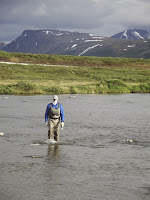
I was so engrossed with my fishing, in fact, that I was oblivious to movement behind me, until I heard the unmistakable sound of footsteps. Recalling vividly the stuffed bear that greeted us in King Salmon, I turned slowly to see one of our guides holding his short barreled twelve gauge in both hands. I had figured initially that it was his steps I heard, but now I'm not so sure.
He winked at me and said ironically, "I just thought you could use a little company ... or more company." The bear I never saw, though he certainly saw me. The next day my brothers, my uncle and I decided to hike upriver while our guides stayed in camp. We were under clear instructions to stay on the waterway at all times, that way we would always know how to get back to camp. Besides, the bush once you got away from the river was darn near impenetrable. We took along a foghorn, which we could blast three times if we needed assistance. Then we headed out, remarking along the way how many bear tracks we were seeing, yet we had not laid eyes on a bear. That was almost more unsettling than actually spying one.
My brother Joe placed his size 16 wading boots beside one of the tracks and noted - for perhaps the first time in his life - that somebody else had bigger feet! I didn't think it prudent to mention my quasi-close encounter the previous evening, so we marched on to more exceptional fishing - several hours of it.
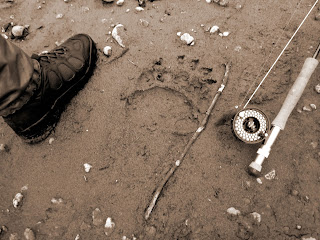 |
| 16 Small |
My brother Joe placed his size 16 wading boots beside one of the tracks and noted - for perhaps the first time in his life - that somebody else had bigger feet! I didn't think it prudent to mention my quasi-close encounter the previous evening, so we marched on to more exceptional fishing - several hours of it.
Around noon, as the day became hotter and we all the more saturated with sweat, especially given that we were hiking in waders, we elected to turn downstream. Our plan was to break camp and float farther down river, through the braids that we were now partly in. Given that we were one of the first groups to float the river that year and the waterways change, sometimes dramatically, we had committed ourselves to staying on the main channel. Our guides had reinforced that need rather relentlessly. But somehow we couldn't manage it. I remember being stymied by some impassable brush, turning inland to get around it, crossing what seemed like a side channel and then finding after 15 minutes of hiking that I had no idea where the main channel of the river was ... or even where I was exactly. My brothers were with me, and my uncle, but we were all a little flummoxed by our situation.
Deciding it was probably best to retrace our steps, we headed back the way we came, only to find ourselves in just as unfamiliar territory as we had been earlier. Without a compass (yes, we were that stupid) and no discernible landmarks to orient by, we began to feel some concern.
We agreed ultimately to travel in 10 minute increments, assessing our direction and progress at those intervals, especially if we had not yet intersected the main channel of the river.
We never did.
At about 2:00 pm, still unable to locate the river or even a small tributary we agreed that we should sound the foghorn. Well, actually, I think my brother Fred raised the issue, and my Uncle Rod responded emphatically, "Blow the f---ing horn!" We sounded it three times as instructed, realizing only after we did so that the blasts - though seemingly loud - would not carry far in the broad, meandering river bottom. Given how far afield we imagined we had roamed, there was little chance our guides would hear our distress call. We hoped at the very least that the horn would push any nearby bears away rather than seem like a dinner bell. Time would tell, we supposed.
We were reassured by only one thing - that we still had plenty of daylight left. And so we continued our search for the main channel, bushwhacking through woods populated by all sorts of potential threats, conserving the few snacks we had, trying to ignore the bugs who didn't need the foghorn to be alert to our presence, and looking desperately for something familiar. Instead, we found a little hope in a small stream, maybe two feet wide and a couple of inches deep. Figuring that everything flows either from or to the main channel, we elected to walk downstream, trusting that it might lead us to larger and larger channels. On the way - maybe an hour later - as the stream grew into a viable and surely never-fished braid - we passed some extraordinary water which, I confess, I fished. Sure we were in peril, but a few casts weren't going to harm the situation any. Or so I figured.
Oddly, it was when we hit our third larger channel that Robert Frost's poem about the road less travelled popped into my head. "Way leads on to way," he writes, and so it did. At approximately 4:00 p.m. we reached what we believed to be the main channel, though it was water we had not floated yet. We turned upstream, trusting that somewhere up there was our camp and two rather concerned guides. Half an hour later - to our immense relief - we spotted the braid on which we were sure our camp lay. Approaching it we heard a nearby shotgun blast.
Our guides were trying to let us know where they were. We answered with our horn. This time they heard it.
We discovered sometime later that one of our guides had, when we did not arrive back at camp at the appointed hour, followed our trail, only to lose it where we lost the main channel. He was as confused as we were at what had happened. Does anybody ever really know how we lose our way?
It is hard to describe the relief we felt, tinged with embarrassment, when we walked into camp some 8 hours after we left it. My 75-year-old uncle, who was the picture of fortitude and endurance during our wanderings noted that he had maybe 15 minutes of walking left in him when we trudged up our braid. He shed his waders, climbed into his tent, and was asleep before his head hit the sleeping bag. My brother Fred zipped up the mosquito netting for him.
It sounded so simple ... follow the river. It wasn't. And though we did manage to self-rescue, it was all the things we should have done - have a compass or maps, carry more food, bring a guide or a gps, etc. - that gnawed at us. Foolishness is particularly conspicuous in hindsight.
 |
| Yes, we were that Stupi |
We agreed ultimately to travel in 10 minute increments, assessing our direction and progress at those intervals, especially if we had not yet intersected the main channel of the river.
We never did.
At about 2:00 pm, still unable to locate the river or even a small tributary we agreed that we should sound the foghorn. Well, actually, I think my brother Fred raised the issue, and my Uncle Rod responded emphatically, "Blow the f---ing horn!" We sounded it three times as instructed, realizing only after we did so that the blasts - though seemingly loud - would not carry far in the broad, meandering river bottom. Given how far afield we imagined we had roamed, there was little chance our guides would hear our distress call. We hoped at the very least that the horn would push any nearby bears away rather than seem like a dinner bell. Time would tell, we supposed.
| Daylight to spare |
Oddly, it was when we hit our third larger channel that Robert Frost's poem about the road less travelled popped into my head. "Way leads on to way," he writes, and so it did. At approximately 4:00 p.m. we reached what we believed to be the main channel, though it was water we had not floated yet. We turned upstream, trusting that somewhere up there was our camp and two rather concerned guides. Half an hour later - to our immense relief - we spotted the braid on which we were sure our camp lay. Approaching it we heard a nearby shotgun blast.
 |
| In Search of Camp |
We discovered sometime later that one of our guides had, when we did not arrive back at camp at the appointed hour, followed our trail, only to lose it where we lost the main channel. He was as confused as we were at what had happened. Does anybody ever really know how we lose our way?
It is hard to describe the relief we felt, tinged with embarrassment, when we walked into camp some 8 hours after we left it. My 75-year-old uncle, who was the picture of fortitude and endurance during our wanderings noted that he had maybe 15 minutes of walking left in him when we trudged up our braid. He shed his waders, climbed into his tent, and was asleep before his head hit the sleeping bag. My brother Fred zipped up the mosquito netting for him.
| Alive and Well |
We didn't dwell on it. We couldn't. We had several days of fishing ahead of us, and thanks to ample portions of good fortune we were alive and well. This was not our first misadventure together, and it probably won't be the last. It was, though, deepely informative, since all of us would have argued that what befell us could only happen to citified greenhorns. Another helping of humble pie, gentlemen?
Perhaps, in fact, this was our version of a mid-life crisis. Having survived it, maybe we'll be okay for another fifty years. Lord knows, there are plenty of fish out there still waiting to be caught. And we might even be willing to get lost again, just to find them...
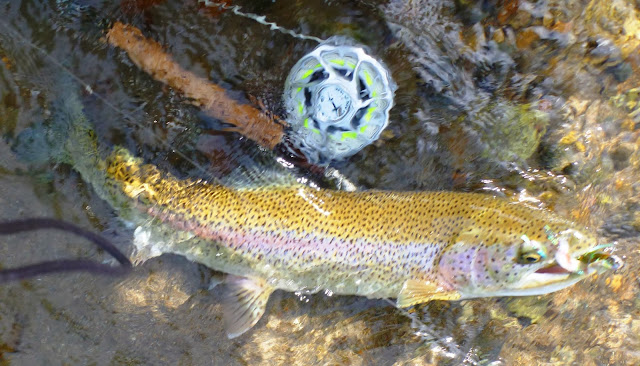 |
| Checkmate! |
Submitted by Ben Williams
Gear to Consider:
Gear to Consider:
- Flask
- Packs
- Flyvines Lanyard
- packable jacket
"Fly Fish the World with Us"



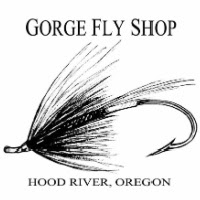







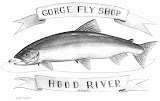









.jpg)

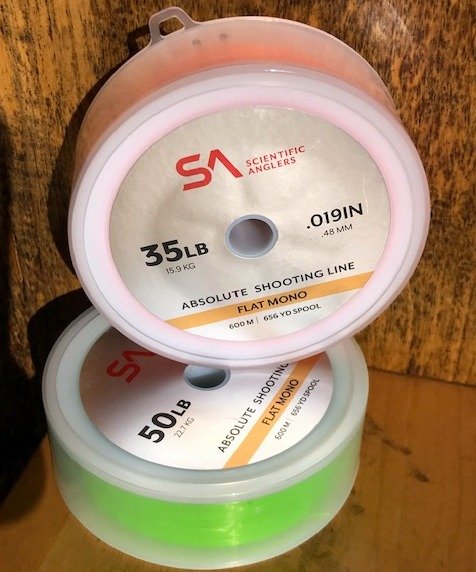

No comments :
Post a Comment